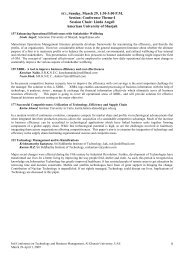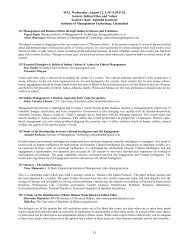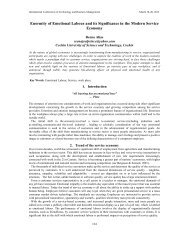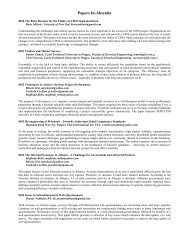Contributed Papers - Icmis.net
Contributed Papers - Icmis.net
Contributed Papers - Icmis.net
Create successful ePaper yourself
Turn your PDF publications into a flip-book with our unique Google optimized e-Paper software.
2B-8, Sunday, January 2, 11:10-12:30 P.M.<br />
Session: Workshop - 3<br />
Session Chair: Sarla Achutan<br />
B K School of Business Management<br />
8439 How to develop websites for teaching classroom courses<br />
Noel Machado, Tata Institute of Social Sciences, noel.machado@gmail.com<br />
This 90-minute workshop is meant for faculty who teach regular classroom courses; it is not about online courses or distance<br />
learning. Knowledge of programming or web-development is not required. The workshop will use Google as a platform for<br />
developing educational websites. Websites significantly reduce administrative tasks and enhance the pedagogical experience (for<br />
both student and faculty).<br />
2D-1, Sunday, January 2, 3:50-5:30 P.M.<br />
Session: Banking<br />
Session Chair: Anoop Rai<br />
Hofstra University<br />
8007 Lending Activities of Foreign Banks During Three US Recessions<br />
Anoop Rai, Hofstra University, anoop.rai@hofstra.edu<br />
Rama Seth, Indian Institute of Management, rama_seth@iimcal.ac.in<br />
Sunil Mohanty, University of St. Thomas, SKMohanty@stthomas.edu<br />
We examine the lending behavior of foreign banks in the US during three recessions, 1990-91, 2000-01 and 2008-09. Prior studies<br />
have shown that foreign banks help mitigate the credit crunch during the 1990-91 recession by increasing their lending relative to<br />
domestic banks. Using a sample of foreign banks paired against a control group of domestic banks, our tests provide more<br />
nuanced results. Foreign banks contribution to lending during recessions are less significant, especially in the recent recession.<br />
Among foreign banks, foreign subsidiaries played a more prominent role than foreign branches and agencies in alleviating the<br />
credit crisis.<br />
8329 Pushing Beyond Banking<br />
Priyank Verma, Yes Bank, priyank.verma@hotmail.com<br />
Since the last decade of 18th century till date in India, Banking has come long way along with lots of transformations, be it in<br />
technology front, customer requirements, government or societal requirements, products or services rendered, infrastructure. With<br />
every passage of a decade, banking has outreached its efforts to support individuals, institutions and nation with different varied<br />
set of issues, challenges and opportunities. Now the question of ‘what next’ is to be answered, i.e. in next 5 or 10 years. Approach<br />
of Advancement and Sustainability will ultimately push the banking beyond new set of challenges and opportunities.<br />
8413 Examining Association of VAIC and EVA with MVA: A Study of the Indian Banks<br />
Karam Pal Narwal, Haryana School of Business, karampalsingh@yahoo.com<br />
Sushila Soriya, Haryana School of Business, sushilasoriya@gmail.com<br />
Jasvir Sura, Department of Business Management<br />
The two measures of intellectual capital-VAIC and EVA developed by Pulic (2001) and Stern Steward & Co. respectively have<br />
been logically considered to assess their association with MVA in Indian Banking industry. The results, based on the data of 20<br />
years, show that VAIC of the banks is increasing and the same is efficiently utilized by the Indian banks. Further, Multiple<br />
regressions show that there is no significant relationship between VAIC and MVA but significant association is observed between<br />
EVA and MVA. For that reason, EVA can be used as benchmark to augment the wealth of the shareholders.<br />
8921 Development of Technological Capabilities to Utilize e-banking Innovations<br />
Naeemeh Javaheri, Islamic Azad University of Science and Research, na_javaheri@yahoo.com<br />
Hosna Panahi, Islamic Azad University of Science and Research, panahi_h@yahoo.com<br />
In recent years, banking structure of Iran has changed from mass automation to a modern one. Improvement of information and<br />
communication technologies have enabled the banking society to achieve new ways of providing services, such as e-banking and<br />
mobile banking. This article explores some factors through which the banks can improve their capabilities to utilize e-banking<br />
technology. Results of the study show that transfer of technology, attraction capacity, crisis construction and dynamic learning<br />
processes are some of the main effective factors in making and developing technological capabilities in the industry.







